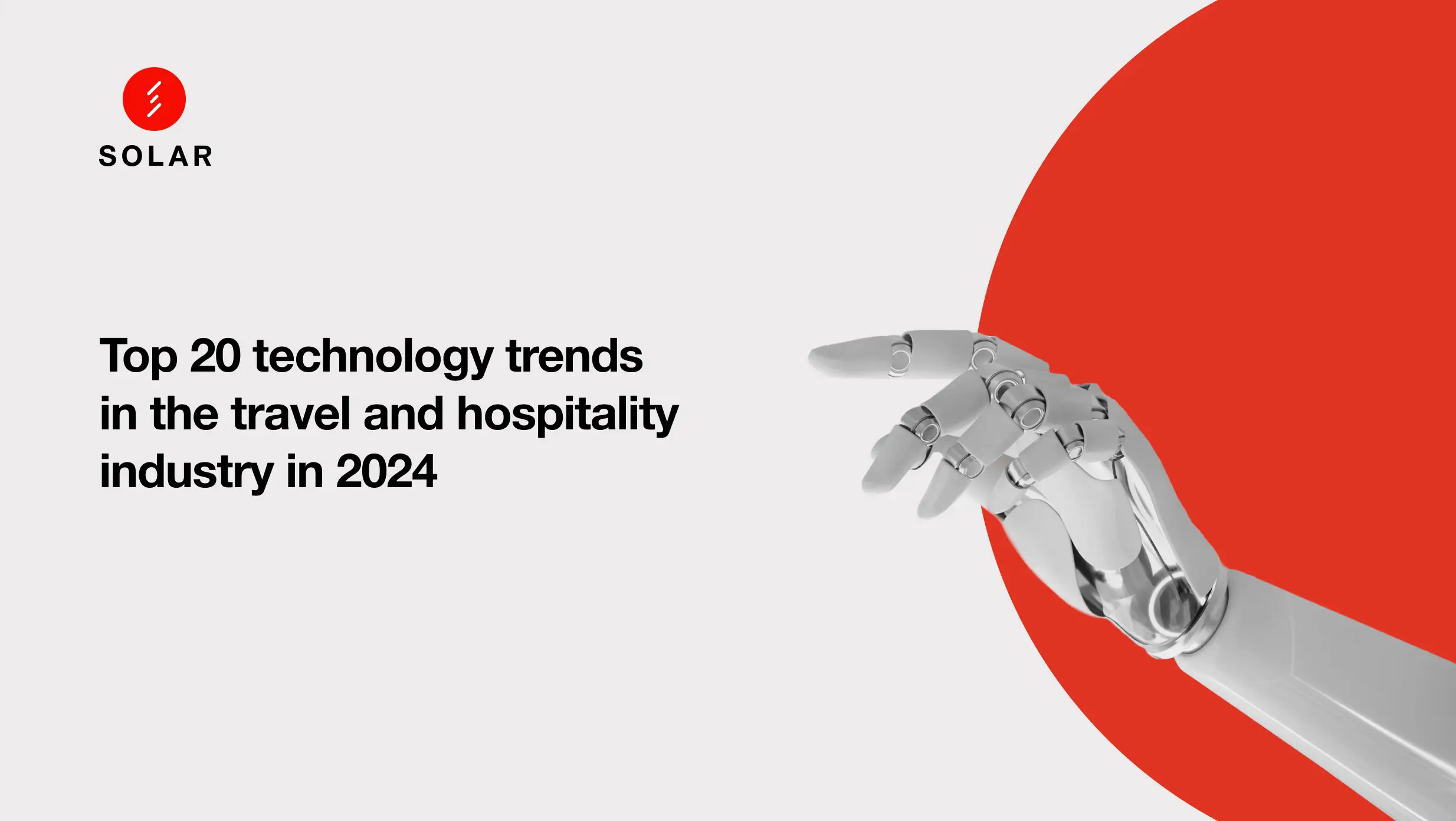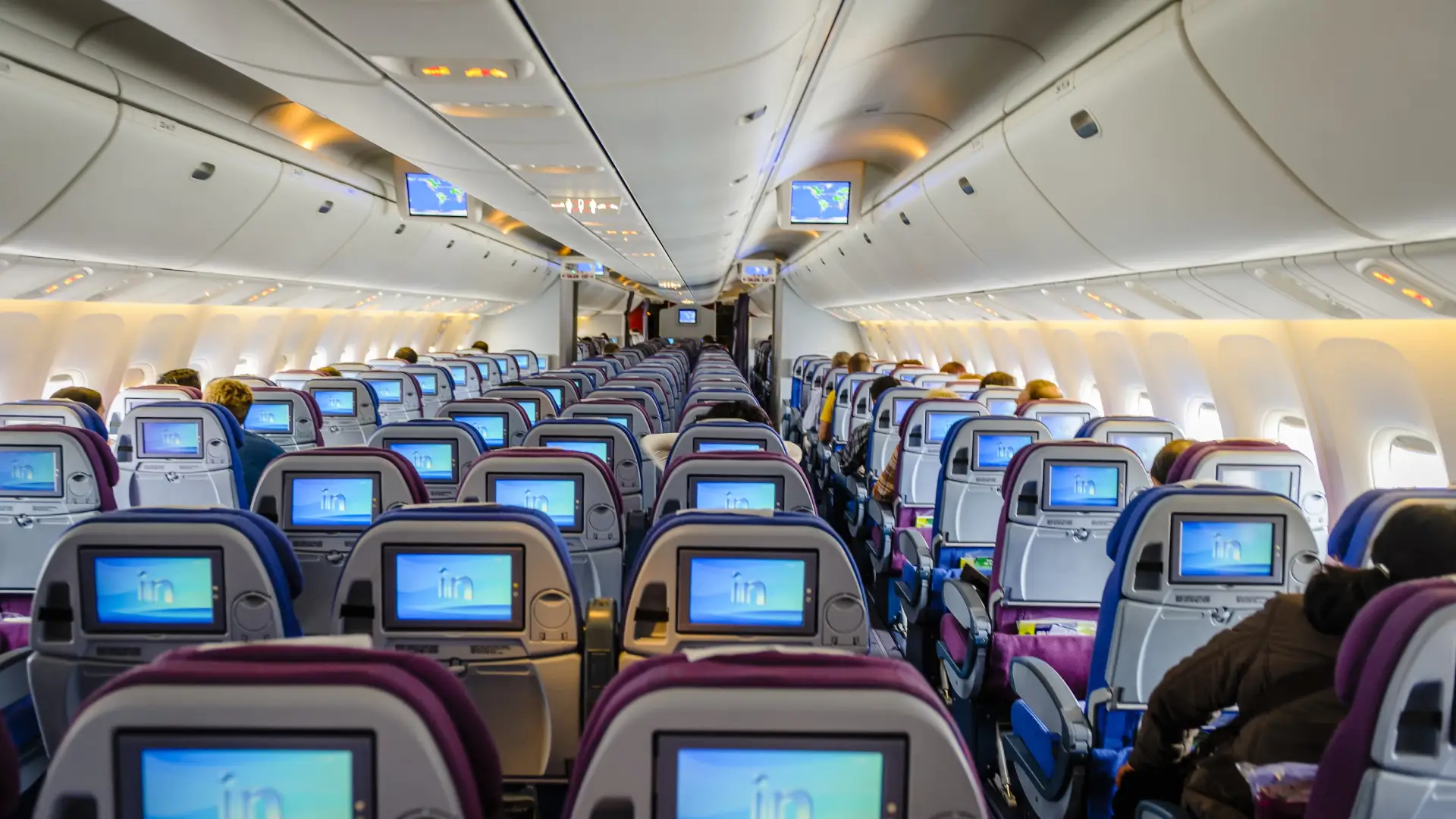Top 20 technology trends in the travel and hospitality industry in 2024
The travel industry is currently undergoing a technological transformation. Changes are taking place at every stage of the travel experience, from how security checks are conducted to how we plan our trips, check into hotels, and travel to our destinations. Let’s take a look at the latest technological trends, such as AI and biometrics, and see how technology is shaping the future of tourism.
Why is travel technology important for businesses in the tourism and travel industry?
Nowadays, almost everyone has a smartphone or mobile device, so travel companies should provide online booking, flight check-in, and destination information. Not only are these trends popular, but they can also help improve customer experience, increase satisfaction rates, enhance brand visibility, and establish credibility. In addition to various other advantages, technology in this industry helps reduce operating costs, enables smart inventory management, improves property management systems, increases efficiency, and provides an incredibly convenient experience. Embracing the latest high-tech trends also leads to improved cash flow and higher profit margins. Therefore, it is wise to learn about and implement them early on.
Staying updated with the latest technology trends is important to stay competitive. If you’re not already aware of the current travel tech trends and why you should embrace them, don’t worry, we’ve got you covered with the top 20 trends in the travel and hospitality industry today.
Top 20 travel technology trends
Now that we’re done with all the facts, reasons, and solutions you must know about, let’s dive right into the goldmine of trends for this year.
1. Mobile booking systems
When it comes to travel planning and booking, an ongoing trend we can observe is the rise of mobile bookings. Many companies are embracing mobile booking due to its various benefits such as contactless payments, easy cancellations, personalized options, loyalty programs, notifications, and in‑depth customer insights. Technological advancements, the introduction of new features on mobile devices, more affordable smartphones and tablets, and the increasing use of mobile internet worldwide are driving the widespread adoption of mobile bookings.
Research suggests that in countries like South Korea, Japan, India, and Brazil, smartphones contribute to 60 % of web traffic. Although European countries are traditionally more conservative in this aspect, they are also witnessing a steady growth in mobile bookings. It is important for businesses to cater to the growing demand for mobile bookings and ensure that their services are easily accessible and user‑friendly on mobile devices.
One of the standout cases for our company is the mobile booking system for Sailica. We developed both a responsive website and a mobile app, offering two distinct booking systems that have proven to be highly effective. The responsive website allows users to easily book their desired sailings, view detailed information about each trip, and make secure payments through a user‑friendly interface. The mobile booking system is specifically designed to cater to users on different mobile devices, ensuring that they can access and navigate through the platform effortlessly. This flexibility in our mobile booking system has greatly contributed to Sailica’s success, as it has allowed them to reach a wider audience and increase their customer base significantly.
2. Robotics technology
Robotics technology is an incredibly fascinating aspect of travel technology that is continuously advancing. In the realm of hotels, for instance, robots are being utilized in concierge-like positions, welcoming and assisting guests upon their arrival. They are even being integrated into cleaning and luggage handling operations, taking on additional responsibilities. Restaurants also have the potential to benefit from the presence of robots in food preparation and service. Some manufacturers have also dabbled in the use of robotics to create smart luggage cases that intelligently follow you around. Furthermore, travel agents are now employing robots for pre-screening purposes, enhancing productivity and reducing waiting times for customers.
The COVID-19 pandemic has had a profound impact on various aspects of the travel industry, and the use of robots has seen a significant increase in response. Their ability to minimize human-to-human contact makes them an ideal solution in these challenging times.
3. Development and integration of chatbots
Integration of chatbots are widely employed in the travel industry as they serve as a valuable supplement to mobile apps, making communication with customers and clients more convenient and cost-effective. The advantage of using chatbots is that guests no longer need to download a separate app to interact with their hotel. Instead, they can rely on a solution they are already familiar with, resulting in reduced development costs and increased hotel loyalty. By employing advanced chatbots, operational costs can be reduced while simultaneously enhancing customer satisfaction, loyalty, efficiency, and productivity. Chatbots help improve a company’s brand image and reputation. They are also capable of gathering valuable data on customer behavior, which can then be utilized to optimize marketing strategies, product offerings, and customer service.
4. Artificial Intelligence (AI)
Artificial Intelligence is poised to bring a significant transformation to the hospitality industry, hotels and travel agencies impacting every aspect of its value chain. This technology holds the potential to capture customer interest, personalize experiences, and enhance overall satisfaction. It is reshaping pricing strategies, accurately predicting seasonal trends, and monitoring customer behavior throughout their stay as well as afterwards.
Given the innate unpredictability of human preferences, AI plays a pivotal role in comprehending the intricate nuances of travel technology trends. Whether it’s the desire to revisit the same holiday cottage, hotel or yacht year after year or the yearning for a novel and adventurous destination, AI is purpose-built for understanding and catering to these complexities. It extends its influence even to the guest rooms, making them intelligent and adaptable to individual requirements, enabling remote control and customization. Another area where AI excels is in enhancing the travel experience itself, ensuring a seamless journey for travelers.
5. Big data
A significant portion of executives in the travel industry recognized the importance of integrating analytics tools into their companies. This decision proved to be highly beneficial for their overall growth and success. Big data has become an integral part of modern tourism management, with nearly all successful companies implementing their own data collection techniques. One of the main applications of this data is to improve personalization. Travel companies utilize the information they gather to tailor their offerings and make specific adjustments to meet the unique needs of their customers. Solar Digital has a remarkable case Boatscribe in its practice. The company first gathered a comprehensive database of yacht rentals from the entire market, including the prices for all these yachts. This data collection resulted in a vast array of valuable big data. Based on this, a product yacht rental market trends was created, covering the global yacht rental market.
Data analysis plays a crucial role in assessing current business performance. Hoteliers, for instance, can effectively leverage big data to manage their revenue by using historical occupancy rates and past trends to anticipate future demand levels. This enables them to optimize pricing and promotional strategies when demand is predictable.
6. Internet of Things (IoT)
One of the most fascinating emerging trends in travel technology is the Internet of Things (IoT), which involves the interconnectedness of everyday devices through the internet, enabling them to send and receive data. The travel and tourism industry has already begun embracing this technology, and its integration is expected to grow further. For example, IoT can be utilized in hotel rooms to provide guests with a device that connects to various amenities such as lighting, heating, and air conditioning, allowing them to be controlled from one central point.
It enables the creation of personalized experiences for customers. Travelers can manage multiple services using their devices, including smart systems, room lighting, elevators, and even electrical circuits in hotels. This level of control enhances customer satisfaction. Companies can gather valuable data from these devices to develop targeted marketing campaigns. By analyzing the data collected, businesses can gain insights into customer preferences and tailor their promotions accordingly.
7. Contactless payments
Another significant development in travel technology is the adoption of contactless payment systems. This allows travel companies to process payments more efficiently, especially in situations where customers don’t have access to cash or traditional credit or debit cards. Not only does this technology streamline transactions, but it also enhances the overall customer experience by saving time. The availability of contactless payments initially began as a convenience, but it has now become an essential aspect of marketing in the tourism industry, particularly in response to the COVID-19 pandemic.
According to the Statista Research Department, contactless mobile payment is one of the leading travel technology trends that boosts customer confidence in traveling. Contactless technology serves as the foundation for modern and technologically advanced payment solutions in the global tourism sector. Already, over 5,000,000 merchants in 77 countries accept contactless cards, showcasing its widespread acceptance and utilization. The primary and most impactful benefit of contactless payments is the convenience, speed, and above all, enhanced security it offers when making purchases with different devices. This significantly contributes to a positive customer experience.
8. Integration of cloud technologies
Integration of cloud technologies brings numerous advantages such as streamlined tour route creation, efficient data storage, virtual call centers, and enhanced control over internal processes. By adopting cloud technologies, travel companies can save on costly hardware and software purchases and support. They also benefit from reduced expenses associated with data storage and processing. The incorporation of cloud technologies provides businesses with scalability options and eliminates the constraints imposed by their own IT infrastructure.
As of 2021, approximately 55 % of global travel companies have already implemented cloud technologies within their operations. The upward trajectory of this trend is expected to continue in 2023 and beyond, as more companies recognize the transformative benefits of cloud integration in the travel industry.
9. Virtual reality (VR)
Virtual reality has emerged as a leading technology in various industries, with its impact on the tourism sector being particularly significant. This groundbreaking technology allows travelers to explore distant destinations from the comfort of their own homes, making it a determining factor in their decision to make a booking.
With VR tours, customers can now virtually experience various aspects of their destination, including hotel accommodations, restaurants, iconic landmarks, national parks, and even specific activities. The interactive and immersive nature of these virtual experiences gives tourism businesses an edge over their competitors who have yet to fully embrace this technological trend. Moreover, VR tours or 360-degree tours can now be accessed through mainstream web browsers, making it easier for hesitant travelers to appreciate the benefits without physically venturing out.
10. Augmented reality (AR)
Augmented reality, a technology that enhances a person’s real environment instead of replacing it, has gained prominence in various industries, including tourism. This technological trend offers several advantages, one of which is its cost-effectiveness compared to virtual reality. With just a smartphone or tablet and an internet connection, users can enjoy augmented reality experiences.
The tourism industry can leverage augmented reality to elevate the customer experience by providing valuable information and entertainment. For example, apps can augment photographs with filters and effects, making them more visually appealing. As customers point their smartphones at local destinations, they can receive real‑time information about the location, enhancing their understanding and engagement.
11. Location-based solutions
Location-based solutions are commonly designed to attract new customers, but they also have significant potential as recommendations for local visitors. By utilizing geo-zones, companies can communicate with existing or prospective customers by sending them targeted messages containing sales information, updates about new products, and other content that may be beneficial to the consumer.
As the demand for personalized services continues to rise, location-based marketing solutions are expected to become increasingly prominent in the travel industry. By leveraging these solutions, businesses can offer tailored recommendations and experiences to their customers, enhancing their overall travel experience.
12. Cybersecurity measures
Cybersecurity has become a crucial area of focus for travel management professionals, as companies in the industry face an increasing risk of cyber-attacks and other types of data breaches. Travel companies are particularly vulnerable targets due to their large workforce and access to extensive customer data. Among the major threats in this field are phishing attacks and ransomware attacks. As a result, investing in cybersecurity training, as well as utilizing various hardware and software solutions, is necessary to ensure the safety of your business.
As more and more companies embrace the travel technology trends mentioned above, data security should also be regarded as an essential component of travel technology in 2024.
13. Hassle-free experiences with biometric
You have likely encountered biometrics in your day-to-day life, and now it’s making its way into the travel industry as well. Biometrics refers to the use of physical or behavioral characteristics to identify and authenticate individuals. In travel, biometric systems that utilize facial and iris recognition technology are being implemented at airports and hotel check-in points. This allows for a faster security process and allows customers to access their rooms without having to wait in line at a reception desk. In 2024 biometric payments will become mainstream in the travel industry. This advancement is reducing the reliance on cash or cards, while simultaneously increasing the efficiency and security of transactions.
14. Innovative tools for socializing
In the ever-evolving technology of the travel and tourism industry, a new trend has emerged that emphasizes bringing travelers closer together and providing innovative tools for socializing. This recent development involves the integration of travel technologies with social media platforms, such as the renowned networking tool called The Solo System by Hostelworld. The concept behind this groundbreaking platform is to offer solo travelers a chat feature that enables them to connect with their future hostel neighbors and fellow adventurers in their destination city. Extensive research conducted by the company revealed that a staggering 76 % of travelers prioritize the opportunity to “meet people” as their primary factor when selecting a hostel. A significant 77 % of travelers expressed their desire to team up with fellow adventurers for shared activities. This pioneering approach in the industry serves as a testament to the growing importance of facilitating social connections and enhancing the overall travel experience.
15. Personalization
When it comes to solo adventurers, they are also at the forefront of the travel technology trends, particularly in the realm of personalization. To meet this demand, various travel companies have turned to the power of data and machine learning to offer personalized recommendations. By gathering and analyzing the key information provided by their customers, these companies are able to generate customized suggestions. This not only saves customers valuable time, but also makes them feel truly valued and understood.
16. Voice control
The rise of voice search technology, aided by the proliferation of smartphones, smart speakers, and AI assistants, has had a significant impact on the travel industry. More and more travelers are using voice search to effortlessly find and book flights, hotels, and various travel experiences. To stay ahead of the curve, it is crucial for businesses to optimize their websites for voice search. By considering voice search as a key aspect of your website design, you can tap into this growing trend and cater to the needs of voice-driven customers.
Hotels are implementing voice-controlled devices in their rooms, allowing guests to adjust lighting, temperature, and access tourist information without having to interact with staff members. This trend is expected to expand further across the industry, enhancing convenience and personalized experiences for travelers.
17. Dynamic scheduling system
The travel industry is characterized by its ever-changing nature, making it crucial to have a system in place to effectively navigate through it. One example of this is the need to find the most cost-effective flight tickets available at any given moment. Since prices often fluctuate, it is beneficial to automate the search process in order to enhance productivity. By implementing a dynamic scheduling system, businesses can experience a notable increase in revenue, ranging from 1 to 3 percent.
The dynamic scheduling system encompasses several key components:
- scheduling optimization system, which identifies the set of -possible routing and changes of schedule to sort it by its profitability;
- access to reliable market data;
- awareness about possible operational restrictions or issues.
By incorporating these elements into their operations, businesses in the travel industry can effectively manage the dynamic nature of the industry and achieve significant improvements in revenue generation.
18. Smarter pricing strategies
Hotels can maximize their revenue by effectively pricing their rooms based on extensive analysis of large data sets that include customer behavior, room occupancy rates, local events, and national holidays. By carefully examining these factors, hotels can identify patterns and trends in demand and adjust their pricing strategies accordingly. This data-driven approach allows hotels to capitalize on periods of increased demand, ensuring that they make the most out of these opportunities. By employing advanced analytics and pricing algorithms, hotels can optimize their revenue and maintain a competitive edge in an ever-evolving market.
For example, our company Solar Digital has developed a cutting-edge system for a hotel network that allows for dynamic pricing of room rates across different time periods. This innovative solution enables our clients to optimize their revenue by adjusting prices based on demand and market conditions. This dynamic pricing approach ensures maximum profitability for our clients while also providing competitive rates to attract more guests. With this system, hotels can easily track and manage room rates in real‑time, making it effortless to adapt to market fluctuations and capitalize on revenue opportunities.
19. The consciousness of sustainable travel
In an era where environmental impact is increasingly at the forefront of people’s minds, the concept of sustainable travel has gained significant traction. Travelers are now actively seeking out eco-friendly accommodations and showing a preference for companies that prioritize sustainable practices. By providing sustainable options, such as eco-friendly stays and carbon offsetting initiatives, your hotel can position itself as a responsible and forward-thinking business, appealing to a growing market of environmentally conscious travelers. This not only helps in attracting a new customer base but also contributes to the preservation of our planet for future generations.
20. Independent websites
Shift towards independent websites is driven by the desire for property owners and hoteliers to have more control over their business. With their own functional and visually appealing websites, they have the freedom to showcase their properties through artistic creation, image galleries, and unique styles. By bypassing online travel agencies (OTAs), these property owners can avoid the commissions typically associated with such platforms. Even large chain hotels and multi-property businesses are joining this trend by operating their own websites. By doing so, they aim to maximize direct bookings and enjoy the autonomy that comes with running their establishments independently.
Conclusion
The advancement of technology has necessitated the implementation of new strategies in the internal operations of travel agencies. The prominent technology trends in the hospitality, tourism and travel industry in 2024 revolve around managing and analyzing vast amounts of data, which are subsequently used by companies to personalize their services. As a result, companies will continue their journey towards digitalization and the automation of their reservation and booking services.
Other trends such as robotics, the Internet of Things (IoT), Artificial Intelligence (AI), Independent websites and contactless check-ins are also gaining momentum in the travel and tourism industry, particularly among medium and large enterprises.
If you are considering the digitalization of any of your services or seeking specific solutions, feel free to reach out to our team at Solar Digital. We offer complimentary consultations with our digital transformation specialists.






